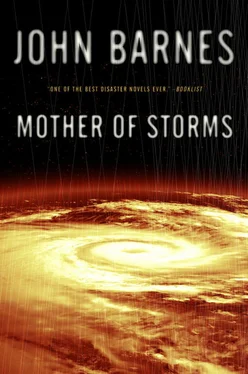She reaches for the autopilot control, sets running for “surface” and tells it to take her up gently. In a moment the thunder of the motors pushing water out the jets begins to sound slightly different as MyBoat begins to climb toward the surface. She gets back to the keyboard, and snips out the important bits into a file she can zap over to Di.
Of course, maybe he knows. Maybe he’s in on it. Well, if that’s the case, at least he can warn her to steer clear of this. And perhaps even tell her a little about what is really going on. On the other hand, if he’s been kept in the dark too… who’s running this show?
No doubt they’ll find out. All they have to do is reveal the findings and see who gets upset enough to try to suppress them. She grins at herself for thinking such melodramatic thoughts.
When the hull of MyBoat finally bursts out onto the Pacific Ocean, Carla has her download ready to go. She dials Di’s number at home before she remembers to check the time zone; fortunately, running submerged, she’s been keeping strange hours, and it’s only ten P.M. there, not unconscionable, although he does have young kids.
His wife, Lori, the mystery writer, answers. She’s always been just a little distant with Carla. When Di and Carla worked together, Di probably talked too much about her at home.
But Lori knows her well enough to know the call must be something important. “Hi. I guess I’d better get Di. He’s asleep with the kids.”
“Thank you, Lori. I’m sorry to have to call so late.”
“It’s all right—if you’re doing it, it’s important. Can I ask you something before I get Di?”
“Of course.”
“How serious is all the stuff happening?” Lori glances to the side, probably checking to make sure that Di isn’t listening. “Di’s been talking in his sleep, thrashing around, coming home from work looking like hell—”
“I’m not surprised,” Carla says. “It’s very serious, Lori, and I’ve got some evidence that it’s even worse than what Di may be thinking.”
Lori nods soberly, and a change comes over her face. Carla thinks to herself, this is the kind of woman who hears it’s dangerous, so she gets a Self Defender. She hears that someone has managed to use AIRE to break a patent, or that fibrop prices have come down, and she knows exactly which stocks in the kids’ college portfolios have to be sold right away. She knows everything she can about the world she lives in and she’s ready to use the knowledge. If anyone should be able to get through this, it’s Lori—she’s what Carla’s boomtalking grandmother would call “a really together lady.”
“Can you tell me anything about it?” Lori asks.
“Well,” Carla says slowly, “I can easily imagine why Di hasn’t wanted to tell you. But I think you’re entitled to get ready for it. I’m afraid this really is a global disaster; a lot of people are going to die and a lot of things are going to change.”
“Is there anything we could do… to be safe?” Lori asks. “I don’t want to ask Di, because he worries enough… but the kids—”
“If I think of anything I’ll call you and tell you. It wouldn’t be a bad idea to spend the summer in the mountains, maybe—you’re only a few miles from the sea, right?”
“Right.” Lori nods like she’s going to start packing right now.
“But I could be dead wrong, Lori. If the Appalachians get the extra water we’re talking about, they might be worse than the coast—flash floods, storms, mudslides, hail, maybe even bad blizzards in July if enough cloud cover develops. We’re just not ready to say. That’s part of why Di is so upset these days, I’m sure—because we’re not ready to say, but we know for sure it’s going to be something big.” Or because he does know what it’s going to be, and he’s holding data back for some weird political reason , she adds, crossing her fingers mentally.
Lori nods. “Thanks for filling me in. I’ll go get Di.”
“Oh, and Lori?”
“Unh-hunh?”
“I loved Slaughterer in Green . My favorite so far.”
Lori beams at her. “Thanks.” She vanishes from the screen and a moment later Di comes onto the camera.
“Carla—what’s up?”
“A lot, I’m afraid. I was talking with Louie earlier today, and he happened to read me off some of the methane density results they’re getting with the satellite-to-satellite shots.”
“You two kids were always so romantic.”
“Oh, belt up. This is important. The numbers he gave me are way higher than the numbers I’ve been getting out of NOAA, and it’s a systematic error—somebody’s been dividing some key data by eight before reporting it. I want to know what’s going on and why this is being done—and if you’re not in on it, I want to give you the real numbers.”
Di looks like he’s been punched in the gut, but he’d look that way whether he was surprised at the information or surprised that she knew it. “What are the numbers, then?” he asks.
She tells him and then drops the second of her three blockbusters. “Now, when you start plugging those numbers in, plot the isotherms on Pacific surface water temperature.”
“Why?”
“Because the thing that our model does is figure size of each hurricane formation zone individually. Generally that’s all that needs to be done and it works, because when you’re only messing with small changes the zones grow or shrink by a hundred miles or so at most.” She tells him about the whole Pacific being one formation zone.
“Think about it, Di, they get bigger the farther they run. Up till now you’ve never had one run two thousand miles through a formation zone. When a big one rips up the U.S. East Coast it’s dying before it clears Florida. But this summer there are some that might get in eight-thousand- or ten-thousand-mile runs before they pile into land… and a hurricane might pass New York City and be headed for Europe, still gaining energy.”
“Now wait a minute, Carla, it’s bad but it’s not that bad. Hurricanes move east to west. They’ll hit land eventually—”
Time for her third blockbuster. “They also move toward the pole. And once you’re up at thirty-two degrees north or so, the steering currents will tend to push them toward the east . You might very well see one or more of them circling around out there and not dying all summer.”
It is characteristic of information that it can be stolen an all but unlimited number of times. When it became clear that one particular senior meteorologist at NOAA might be sitting at the focal point, that clarity—that little note that “this is what probably matters”—became information in and of itself, and was worth stealing. A dozen monitoring programs stole it at once, and dozens more stole from each of them, and from the places they passed it on to, until by now practically everyone who matters knows that Diogenes Callare matters. One of the few who doesn’t know is Diogenes Callare.
He hasn’t noticed his superiors treating him with kid gloves, though they are, or the FBI men who watch him constantly.
What he has noticed is how much seems to be kept from him, as if no one wants him to figure anything out. So Carla Tynan’s phone call finally makes it click into place, and he’s been in Washington for far too long not to realize that if so much is being kept from him, it’s because he’s more important than he thinks he is. It’s a long step down the road to paranoia, but it’s been a proverb for a hundred years that being paranoid does not mean that they aren’t out to get you.
As he hangs up, he thinks of a dozen little details… an instrument report or two that he had discarded as too far out of bounds—and which had disappeared later. One or two people at NOAA whom he had thought were new hires, people he’d never seen before, who seemed to spend all the time they were not in meetings on the phone and didn’t seem to know a lot of meteorology. Having overheard one new supervisor getting an explanation about methane being CH 4and opaque in the infrared from another of the new hires.
Читать дальше












